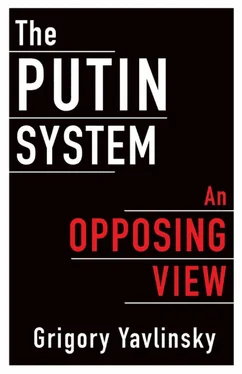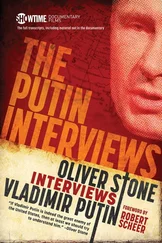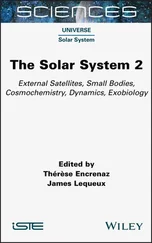Because it corresponded to Russia’s newly acquired position on the periphery of the world (capitalist) economy, I called the system a “peripheral” system, referring to both its economy and its political design. What I meant was that the political system featured the interrelation between marked features of a peripheral economy—which didn’t contain built-in mechanisms to modernize competitiveness or to capture new markets through diversified innovations—and a retrograde autocracy that relied on inert bureaucracy and public employees rather than dynamic private business. Control of the proceeds from the export of oil, gas, and other resources in the era of high and rising world prices for these resources made it completely unnecessary for the top authorities to care about nurturing an alternative tax base to be imposed on booming private business activities. Indeed, private business would inevitably have brought about an uncontrollable flow of private funds to be used for political lobbying and the sponsoring of alternative political groups. Instead, export proceeds and indirect taxes from transactions involving resources were used to establish an essentially antidemocratic and antimodernizing coalition of beneficiaries of a patronage autocracy. A system of “feeding” large social groups and local communities through a vertical chain of distribution of funds in the name of the “national leader” made it possible to secure popular support for, or at least indifference to, the authorities’ suppression of dissenting groups and their attempts to build political opposition.
At the same time, the lack of an incentive to connect with competitive Western markets for sophisticated products and related services made it possible to isolate the country from foreign influences or attempts at political control. This enabled the authorities to protect authoritarian rule by erecting ideological walls through overt propaganda about Russia’s exceptionalism and about the need to defend national values and sovereignty from hostile foreign agents and their collaborators inside Russia, who were trying to break the tie between a “sovereign” ruler and his people. The old trick of identifying antigovernment actions and feelings as anti-Russian and subversive of national statehood was used to its utmost, with no efforts spared and no opportunity lost to convince people of the need to support and defend their rulers from hostile attitudes, attacks, or criticism. Relations with the outside world came to be viewed as basically the age-old war between good and evil, with “them” representing evil and “us” the good, who are intentionally slandered or misinterpreted. This picture leaves absolutely no room for even well-intended dissent, let alone competition for power, thus cementing the political construction erected by the autocratic regime.
Nevertheless, I felt there was still some room for history to make corrections or even considerable alterations to this scenario. Despite the correlation between economic and political systems in a society, I insisted that Russia’s political system was not finally and irrevocably determined in every detail and trend, and that this left some opportunities for opposing forces to work sensibly to adjust the system to actual challenges.
Indeed, I believed it possible to prevent the Russian political system from preserving its retrograde and stagnation-prone character for decades, to make it more flexible and reactive in dealing with the serious threats and difficulties it faces. As Russia’s time horizon most probably stretches beyond the lifetime of its present political system, it is important to minimize the damage done to Russia’s economy and future potential, even though this may help the system to survive longer than otherwise would be expected.
To accomplish this, I thought it necessary to organize and maintain powerful pressure from the roots of society, through public discussions and the use of the opportunities (however small they might be) provided by the remaining elements and rudiments of a free political system in Russia. For that very reason, I decided to take part in the presidential elections of 2018, knowing quite definitely that the system was impervious to any attempts by outsiders to change the planned scenario, let alone to win a potentially dangerous percentage of the popular vote. Indeed, I didn’t even mind suffering a depressing defeat if that would make Russia’s present rulers tone down their intolerance and take a more realistic look at Russia’s present situation and future agenda. This attitude draws a line between responsible (and actually patriotic) opposition and those who are totally indifferent to the future lot of their country.
So what did we have during the past three years? The shortest answer would be “More of the same.” I must admit that my cautious optimism with regard to possible changes in the system proved to be largely unfounded. Developments in Russia in recent years have not brought it any closer to the desirable U-turn or to a visible shift in major policy areas, and that is true of foreign policy as well as most domestic policy issues. On the contrary, signs have become more pronounced that Russia’s autocracy is developing along the lines of long-term usurpation of power by a very close circle of people that see politics in terms of highly personal power play rather than as a mechanism to ensure the long-term survival of Russian statehood. Given the consequences of such a usurpation, in both the midterm and the long term the spectrum of remaining opportunities for change has become much narrower, at least for the next five to fifteen years.
Among all the recent changes since the book was originally written, I would highlight three in particular. The first is the increasingly strong reliance of Russia’s autocracy on tight ideological pressure on society. I had written that stressing an officially imposed ideology was a relatively new phenomenon for Russia’s postcommunist rulers. As recently as in the aughts, they preferred to abstain from developing a clear-cut official doctrine (or “national idea”) that would be imposed on people by a powerful propaganda machine. Instead, they preferred vague ideals of “people’s well-being,” “steady development,” and “might and prosperity,” which would blur societal divisions and broaden the social base of the ruling regime. It was only in the early 2010s that patriotic rhetoric became increasingly xenophobic and nostalgic for the days of the Soviet “great empire,” in geopolitical and cultural terms. In parallel, the regime has come to be treated as divine (God-given), indivisible from the idea of statehood, devoid of any internal divisions, and exclusive of control by laypeople.
By now these ideas have been officially codified as Russia’s “traditional values,” while the values of civil liberties, distribution of power between countervailing centers, mutual checks and balances, and the right of the governed to change their rulers have been declared alien to Russian traditions and subversive with regard to Russia’s identity and security.
What makes things worse is that the official rhetoric of recent years has incorporated many elements of traditional Russian nationalism, such as the idea of a distinctly different “Russian civilization” ( Russkii mir ) that is antagonistic to Atlantic European civilization; the idea of the special historical mission of the Russian people, which presumes a right and duty to guide other nations in the form of benevolent empire; and the vision of the country’s rulers as the central element and instrument of that mission rather than as a tool for maintaining daily life of its people to their benefit. By integrating into Russian nationalism certain leftist attitudes and approaches—such as a view of private property rights as conditional and secondary to national (state) rights, which are embodied in and established by the nation’s rulers; animosity toward cosmopolitan global capital and business; and others—Russia’s current rulers have managed to present Russia’s ancient, imperial, Soviet, and post-Soviet history as an eternal fight for Russia’s survival in a hostile, aggressive surrounding world that is eager to destroy Russian civilization and its intrinsic unity of the people with its rulers. In this context, the goal of raising standards of living and improving people’s well-being is naturally replaced by the idea that people’s lives are a tool in the mission of defending, “strengthening,” and expanding Russian rule, which is the highest value.
Читать дальше












